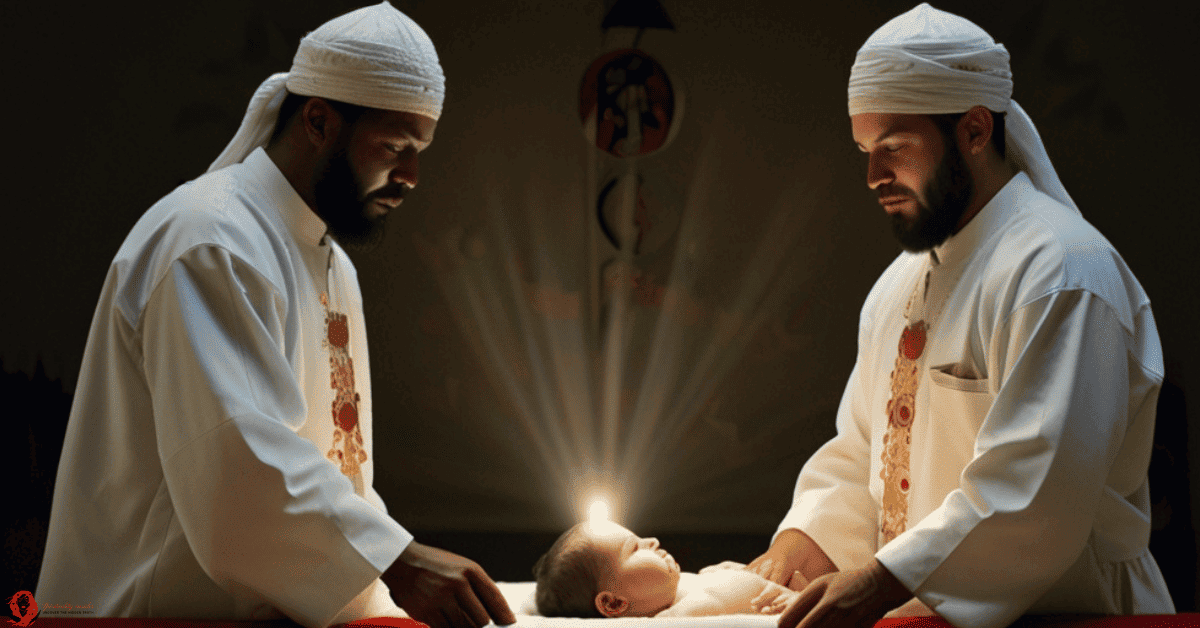Do you ever wonder if there are any spiritual connotations behind circumcision? This old practice has persisted in human culture for thousands of years, carrying immense religious values and symbolic importance for numerous communities around the world.
In this post, we are going to delve into the spiritual meaning of circumcision from different religious perspectives. But first, let’s look at the short answer to your query.
Short Answer
The spiritual meaning of circumcision represents commitment, inner transformation, a covenant with God, purification, and a rite of passage. In Judaism and Islam, it’s a significant religious practice, while in Christianity it’s largely metaphorical.
What is circumcision?
Circumcision is a process whereby the foreskin of the male genitals is removed. While there are religious and hygienic dimensions to it, our attention will be on its spiritual aspect.
What is the spiritual meaning of circumcision?
Spiritual circumcision means an inner transformation of the soul beyond physical rituals. It’s about taking out the spiritual dirt and dedicating oneself to a higher calling.
Unlike physical circumcision, religious teachings describe spiritual circumcision as metaphorical, emphasizing personal development, devotion, and a deepened connection with God.
This process requires one to cast off ungodly attributes, embrace virtues, and set his life in line with spiritual laws.
What is a spiritual circumcision of the heart?
In Christian literature, there is a concept called spiritual or metaphysical circumcision where both the Old and New Testaments are used as sources.
It is an alteration of one’s desires, motivations, and values to match those of God. Symbolic ‘cutting away’ involves the elimination of stony hearts, selfishness, and worldly attachments from within the individual concerned.
It means growing a heart that responds to directions from God through love, compassion, and faithfulness. In contrast to literal circumcision, which is practiced only on a few gendered individuals or tribes within Judaism,.
Alongside circumcision, you must also know the spiritual meaning of other religious obligations, such as fasting.

Circumcision bible meaning
The meaning of circumcision in the Bible comprises an intricate symbol that has increasingly gained diverse spiritual meanings throughout biblical literature.
The biblical meaning of circumcision initially appeared as a physical seal between Yahweh and Abraham in Genesis, but it developed into something more than a simple surgical procedure.
In the Old Testament, circumcision signifies:
Covenant: A manifest reminder of God’s special relationship with his chosen ones
Obedience: Showcasing faith through adherence to divine decrees
Purification: Spiritual cleansing for consecrated living
Identity: Marking one’s status as an Israelite
However, New Testament teachings redefine what circumcision means:
Spiritual Transformation: Paul talks of having been circumcised in the heart rather than outward signs.
Faith Above Law: This becomes an icon for the new covenant that stresses faith instead of Mosaic law-keeping.
Universal Inclusion: The concept expands to include Gentiles in God’s family without physical circumcision.
Baptism Parallel: Some see baptism as a Christian version of circumcision.
This aside, discussion on biblical circumcision also became controversial, especially within early Christianity.
Speaking of historical practices, you might also be interested in knowing the spiritual meaning of alchemists. The experiment King!!
Grace and faith triumphed over traditional Jewish practices at this landmark, before which believers were expected to undergo ritual surgery (in Acts 15).
Therefore, following the ruling of the apostle-led Jerusalem council, no convert would be subject to additional requirements beyond the belief that Jesus Christ is the only way to be saved.
Further, there are metaphoric uses of circumcision imagery in the Bible:
“Circumcised lips” (Exodus 6:12) point to eloquence when speaking.
“Circumcised ears” (Jeremiah 6:10) suggest attentiveness toward God’s word.
“Circumcised heart” (Deuteronomy 30:6) denotes a fully committed spirit to God.
So, circumcision becomes a strong metaphor that runs through the entire scripture, indicating the move from external religious acts to internal spiritual changes.
It is an embodiment of covenant, faith, and the changing relationship between humans and their maker, as seen in the Bible at large.

How does Islam view the spiritual significance of circumcision?
Islam also regards circumcision, also called khitan, as an important spiritual practice, even though it is not explicitly mentioned in the Quran but is widely practiced across Muslim societies due to its importance in Islamic culture. But what’s its essence from a religious perspective?
Among Muslims, the spiritual significance of circumcision encompasses:
Following Prophet Muhammad’s example, believers hold that he was born circumcised or was circumcised while still young.
Purity: In order to uphold sanctity at both physical and spiritual levels , this operation should be carried out
Submission to Allah: Just like Jewish faith, where it represents obedience towards divine will
Community identity: The boy belongs to Muslim society through its performance
Interestingly enough, however, though more widespread among Muslims, circumcision in Islam is more lenient with timing. From infancy to puberty, circumcision can be done at any age, allowing for cultural diversity among Muslims.
What is the spiritual meaning of circumcision in Judaism?
Circumcision holds very deep spiritual significance in the Jewish religion. This rite is referred to as brit milah or bris, and it is viewed as a physical covenant between God and Jews. However, what does this mean on a spiritual level?
Abraham, the patriarch of the Bible, is credited with starting the custom when God commanded him and his offspring to undergo circumcision as a sign of their unique bond with Him.
It signifies that Jews commit themselves to God and are ready to follow His commandments.
Spiritually, circumcision in Judaism stands for:
Covenant: It acts as a constant reminder of the everlasting connection between God and the Israelites.
Sacrifice: The foreskin removal points out the sacrifice of oneself to God.
Purification: It serves as purification of the body and soul.
Identity: Circumcision indicates acceptance of Jewish male identity.
For many Jews, the spiritual significance behind male circumcision goes beyond mere acts. It is an intense moment of identification with their tradition, belief system, and community that allows them to feel connected with past generations and future generations.

What are some common misconceptions about the spiritual meaning of circumcision?
As with many religious and cultural practices, there are several myths surrounding the spiritual meaning of circumcision. Let us also address some:
Misconception: It’s only about Hygiene alone
Fact: The English language term “circumcision” may be used for various reasons other than just cleanliness, even for people who talk about it related to faith or tradition.
Misconception: Required by all religions
Fact: While significant in some religions’ traditional practices, not every religion demands its members undertake ritual male genital cutting (Jewish Encyclopedia).
Misconception: It’s purely symbolic
Fact: For many believers, this thing has deep-rooted implications that go way beyond the figurative sense, implying that it actually represents an agreement or covenant in genuine terms.
Misconception: A universal practice worldwide
Fact: There are huge disparities in spiritual meaning and practice between different communities, even among groups belonging to the same religious background.
Misconception: gender-specific
Fact: Male circumcision is predominant, but some societies practice female genital mutilation, which often damages the health of such girls.

Are there spiritual meanings of circumcision in other cultures and traditions?
Yes indeed! The spiritual meaning of circumcision goes beyond the confines of Abrahamic religions.
For ages, a number of indigenous societies across the globe have been circumcising their members as part of their religious and cultural practices. Let’s take a look at some:
Aboriginal Australian Traditions:
In a few Aboriginal cultures, circumcision is one of the initiation processes that boys undergo to become men. They think that it is an ancestral experience.
African tribal practices:
Among many African peoples, this procedure means male entry into adulthood. There is often pain to be endured, seen as bravery or manliness.
Philippine traditions:
Circumcision forms among some Philippine ethnicities; most consider it as part of their spiritual cleansing and readiness for adult life.
Polynesian cultures:
Some Polynesian cultures allowed themselves to engage in circumcision, which was related to intricate religious ceremonies, with a deep sense of purity or belongingness.

Frequently Asked Questions:
Conclusion:
In conclusion, the spiritual meaning of circumcision is profound and complex for many people globally.
Thus, from ancient pacts up to present interfaith dialogues, it continues to be a strong emblem for faith, identity, and spiritual commitment.
I hope you truly understood the spiritual meaning of circumcision. Don’t forget to leave your feedback in the comments section below. Stay Blessed!




